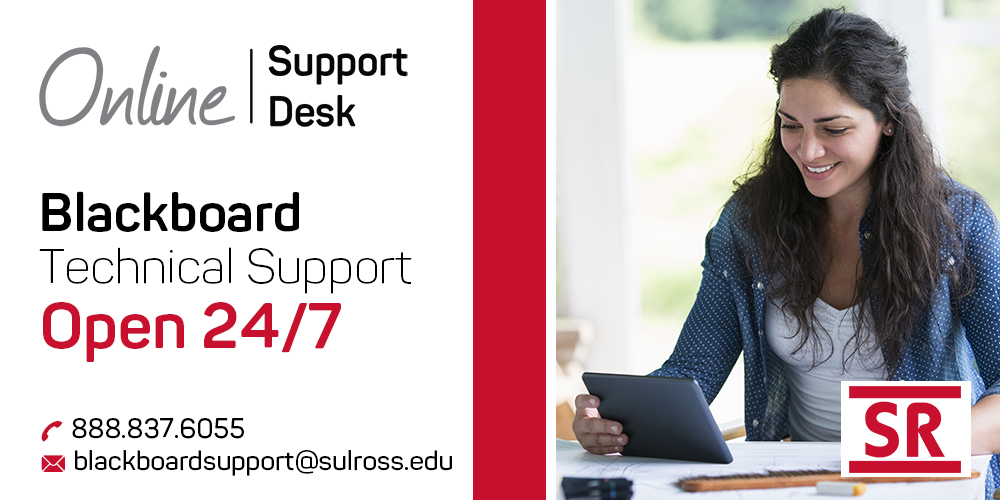
Initiative is first phase of TSUS shared services with SHSU Online
Sul Ross State University faculty and students now have a 24/7 Blackboard Online Support Desk and toll free hotline available. The new feature was made available on Monday, May 18 and coincides with the start of the 2020 summer terms.
The goal of the new Online Support Desk is to provide the best Blackboard support and online educational experience for Sul Ross faculty and students at any time, day or night, and the Online Support Desk team is excited to start serving the Lobo community and make each experience with the Support team a positive one.
SRSU faculty and students can reach the Blackboard Online Support Desk by calling (888) 837-6055, or by emailing blackboardsupport@sulross.edu.
The 24/7 Blackboard Online Support Desk is the first phase of a shared services support collaboration resulting from a Memorandum of Understanding (MOU) with Sam Houston State University that SRSU undertook earlier this spring. The objective of this partnership initiative is to share services and resources in support of improving and expanding quality online education within the Texas State University System.
“Over the coming months Sul Ross online faculty will benefit greatly from access to resources previously unavailable to a smaller college such as advanced Blackboard components that promote a richer DE learning experience and online community, system-wide software licenses, and SHSU Online instructional design support.” said Tim Parsons, SRSU Blackboard Administrator and Graduate Student Center & Instructional Support area supervisor. “Sul Ross faculty have already benefitted greatly from access to seven weeks of Sam Houston State University Online webinars, and on top of that, SHSU Online also recently opened up their annual Online Course Redesign and Faculty Certification program to Sul Ross instructors.”
Dr. Bill Angrove, the executive responsible for leadership of Sam Houston State University Online (SHSU Online) and the Chief Online Officer of the Texas State University System (TSUS), offered his perspectives on the current partnership with Sul Ross.
“From the beginning, SHSU Online has taken a systems approach to online learning,” Angrove said. “This means that distance education is fully integrated into all operations of the university.”
Angrove added that in the distance education literature, SHSU functions as a “dual–mode” institution, in which a unique and separate organization is created to support academic departments that deliver instruction online. These online organizations include administrators, instructional designers, graphic designers, video producers, writers, trainers, and technical support staff.
“All of whose responsibility is to develop and support online courses and degree programs across campus,” he said.
According to Angrove, the systems approach SHSU Online includes both centralized and decentralized organizational structures.
“For example, we intentionally decentralized the instructional designers’ work by assigning them to each individual college, while simultaneously creating a centralized 24/7 support desk,” said Angrove. “This organizational model is being expanded to include smaller institutions like Lamar Institute of Technology and Sul Ross State because we are able to seamlessly increase the scale of the support operations to include additional faculty and students.”
“These organizational structures, combined with the use of enterprise applications and technologies, have created one of the strongest distance education organizations in American higher education,” he said.
Angrove noted that the systems approach to online learning has proven effective.
“Sam Houston State has a Memorandum of Understanding with both Lamar Institute of Technoloy and Sul Ross State University to provide full support of their online and on-campus courses by integrating our suite of enterprise technologies, leveraging the expertise of our staff, and negotiating system-wide licensing agreements for Blackboard, proctoring software, ADA compliance software, and more,” said Angrove. “This type of ‘systems thinking’ and implementation has already enabled Lamar Institute of Technology to operate more effectively during the COVID-19 crisis.”
